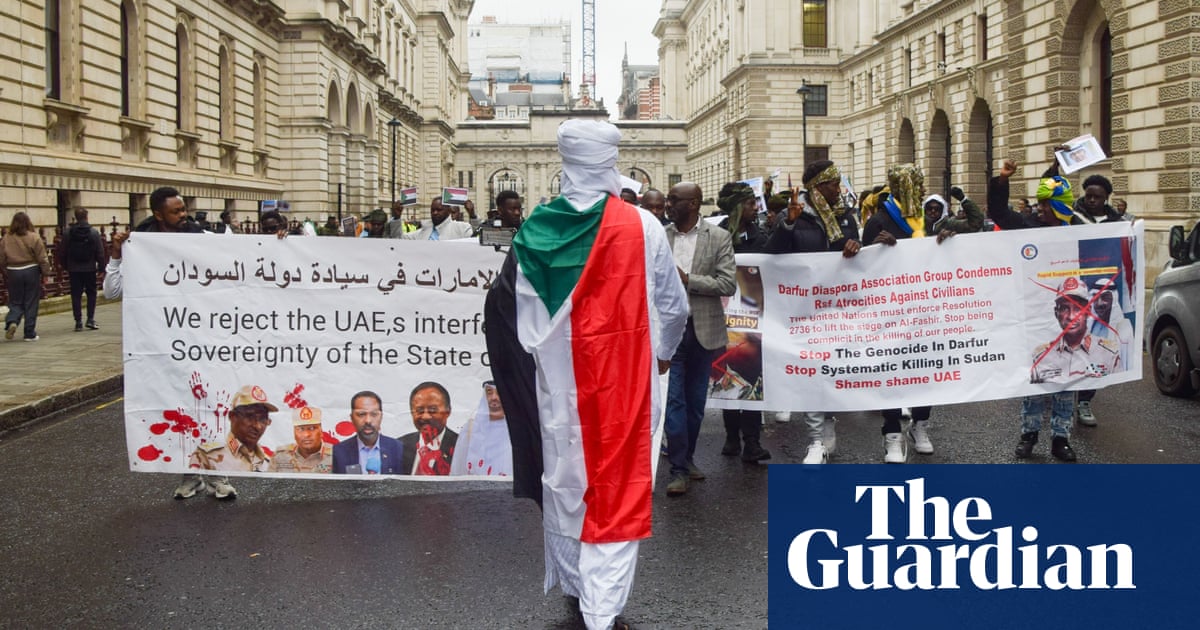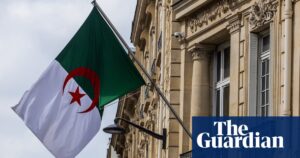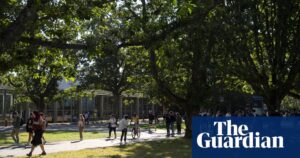
A British-led attempt to establish a contact group to facilitate ceasefire talks in Sudan fell apart on Tuesday when Arab states refused to sign a joint communique after a conference in London.
The daylong argument between Egypt, Saudi Arabia and the United Arab Emirates over the communique represents a big diplomatic setback for efforts to end two years of civil war in Sudan.
Hopes of a negotiated end to the conflict were further dimmed late on Tuesday when the leader of the paramilitary Rapid Support Forces, Mohamed Hamdan Dagalo, known as Hemedti, declared the establishment of a government rivalling the army-backed administration.
“On this anniversary, we proudly declare the establishment of the Government of Peace and Unity, a broad coalition that reflects the true face of Sudan,” Dagalo said in a statement on Telegram.
Hundreds of civilians have been killed in two major refugee camps in Darfur in recent days, and millions have been displaced by the fighting. TheForeign Office said it was saddened that agreement on a political way forward had not been reached, but insisted progress had been made.
In the absence of a final communique, the UK foreign secretary, David Lammy, and his counterparts from France, Germany, the African Union and the EU issued a joint co-chairs’ statement pledging to support “efforts to find a peaceful solution and reject all activities, including external interference, that heighten tensions or that prolong or enable fighting”.
The statement also called for a solution that did not lead to Sudan’s partition.
Lammy had opened the conference with high hopes. “Many have given up on Sudan. That is wrong,” he said. “It’s morally wrong when we see so many civilians beheaded, infants as young as one subjected to sexual violence, more people facing famine than anywhere else in the world.
“We simply cannot look away. And as I speak, civilians and aid workers in El Fasher and Zamzam IDP camp are facing unimaginable violence.
“The biggest obstacle is not a lack of funding or texts at the United Nations, it’s lack of political will. Very simply, we have got to persuade the warring parties to protect civilians, to let aid in and across the country, and to put peace first.”
His effort to persuade the Arab states to agree a set of diplomatic principles for a future contact group did not, however, bear fruit.
Officials had said the conference did not constitute an attempt at mediation or aid-pledging, but instead intended to build greater political coherence about Sudan’s future among the many countries that have claimed a stake in the country.
In a measure of the expanding, intractable and externally fuelled nature of the war, Lammy chose not to invite any of the principal Sudanese actors or members of civilian society. The conference’s objectives are set modestly at seeking agreement on an African Union-led international contact group, and renewed commitments to end restrictions on aid.
The war, which erupted in April 2023, stemmed from a power struggle between Dagalo’s Rapid Support Forces and the army, led by Gen Abdel Fattah al-Burhan.
The aim of establishing a contact group had been to persuade Middle Eastern states to focus on diplomacy rather than strengthening the warring factions. But from the start officials struggled to find neutral wording that Egypt and the United Arab Emirates could accept on Sudan’s future.
Sudan and others have long accused the UAE of arming the RSF – which it strenuously denies – while Egypt has maintained close ties with the Sudanese army.
Sudan’s government criticised the conference organisers for excluding it from the meeting while inviting the UAE.
The UAE minister for political affairs, Lana Nusseibeh, who attended the conference, said both sides were committing atrocities and condemned the recent RSF attacks on displacement camps. She called for an unconditional ceasefire, the end to unconscionable obstruction of humanitarian aid, and a transition to an independent civilian-led government.
The army and the RSF have both been accused of committing atrocities in the course of the war, which has killed tens of thousands of people, displaced 13 million, and pushed large parts of the country into famine.
Two refugee camps in Darfur, the site of a genocide in the 2000s, were captured in the past few days by the RSF as it seeks to take El Fasher, the only major population centre in Darfur not under its control.
Lammy also announced an extra £120m in humanitarian aid from the depleted UK Foreign Office aid budget, enough to help deliver food to 650,000 people. The German foreign minister, Annalena Baerbock, released a further €125m (£105m) for Sudan and neighbouring states.
At a separate event on Tuesday morning, aid and human rights groups called on the international community to punish the vast array of countries accused of either directly or indirectly sending arms to the warring parties in breach of a UN arms embargo.
“The international community will have utterly failed if we have a conference today including those actively involved in the conflict and nothing comes from it again,” said Yasmine Ahmed, the UK director of Human Rights Watch. “We need a coalition of states with the UK and the co-hosts at the front ready to say we are galvanising the necessary political momentum to protect civilians on the ground.
“It is necessary that it is made clear that this cannot continue. The international community cannot sleepwalk into another genocide. They have international obligations to protect and respect international law.”
However, neither side seems interested in discussing peace, and some fear the country is heading for a form of partition based around the current areas of control.
The meeting comes against the backdrop of US cuts to its aid programme.
Kate Phillips-Barrasso, a vice-president of global policy at the aid group Mercy Corps, said the nature of the US cuts meant it was hard to know how badly Sudan had been affected, but in her agency’s case, a lifeline for 220,000 people had been cut.
Source: theguardian.com


















